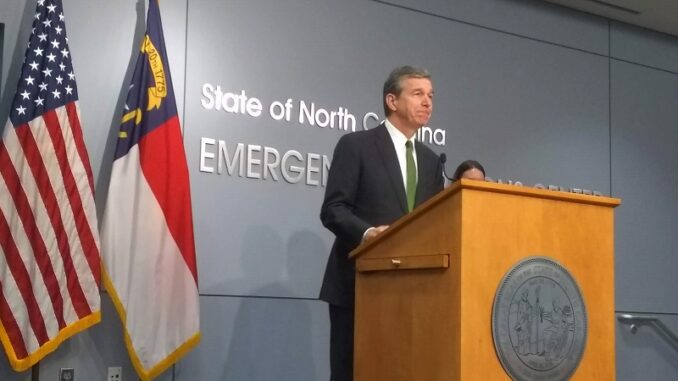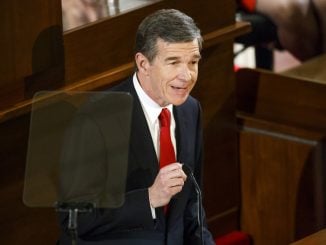
RALEIGH — North Carolina General Assembly House members voted to pass a bill requiring the governor to seek concurrence with the Council of State on future emergency orders on Oct. 20. The bill has been sent to Gov. Roy Cooper, but it is anticipated he will veto the measure.
The concurrence vote on the House Bill 264, The Emergency Powers Act, passed almost completely down party lines by a vote of 65-45. A single Democrat, state Rep. Michael Wray (D-Halifax) voted in favor along with Republicans.
“During the pandemic, our governor ignored his statutory duty to seek the concurrence of the bipartisan council of state before declaring a state of emergency,” House Speaker Tim Moore (R-Kings Mountain) said in a statement. “With no end date in sight, North Carolina has remained in a perpetual state of emergency.”
Moore continued, “The need for checks and balances is arguably most crucial during a statewide emergency. No one individual should have the ability to exercise unilateral power during such an emergency.”
House Bill 264 requires the governor to obtain concurrence from the Council of State 48 hours prior to issuance of a statewide emergency or imminent hazard declaration. All documentation pertaining to the request for concurrence are deemed public records.
The bill defines “statewide emergency” as any area equal to at least two-thirds or more of the state’s counties.
“The legislature must address the endless duration of power that has been granted to the Governor during a self-declared and boundless state of emergency,” said Rep. Keith Kidwell (R-Beaufort), the primary sponsor of House Bill 264. “Simply put, there is no unilateral rule in a constitutional republic. This legislation reinstates much needed checks and balances over the Governor’s unlimited emergency powers.”
Additionally, the bill would require a statewide state of emergency order (SOE) to expire within seven calendar days unless the Council of State approved an extension and can be for no more than 45 days without the General Assembly by enacting an extension legislatively.
Under the measure, the governor cannot try to issue an extension of a current order or a new order similar to any that have been rejected by the Council of State.
The governor was asked multiple times by North State Journal about his COVID-19 SOE, but has refused to answer when he will lift it. Cooper said that the SOE was necessary to “draw down federal funds.”
In a June 2021 press release, Cooper claimed that under an SOE, North Carolina has “easier access to federal funding including FEMA Public Assistance reimbursements, and schools can follow uniform safety guidance under the StrongSchoolsNC Public Health Toolkit.”
North State Journal was unable to find a basis for Cooper’s statements related to the SOE being necessary to retain federal funding. After digging into the governor’s claim, it appears that FEMA reimbursements only require a presidential disaster declaration, not a state-level state of emergency declaration. The governor’s office to date has not supplied any additional specifics.
Last July, Cooper vetoed a similar bill, Senate Bill 105, which would have made clarifications to the state’s Emergency Management Act by including a requirement the governor seek concurrence on such orders from the Council of State.
“The Emergency Management Act clearly provides the governor with statutory authority to direct the state’s response to a public health emergency that could affect the entire state’s population,” Cooper said of his veto on Senate Bill 105.
Cooper said requiring concurrence would place “additional bureaucratic and administrative obligations on the declaration of a state of emergency” and would be “a substantial change in the law.”
If Cooper vetoes the bill, it will be his 65th since taking office in January of 2017. Cooper currently holds 65 percent of all vetoes issued by North Carolina governors.
Prior to Cooper, only 35 gubernatorial vetoes have been issued spanning the terms of four governors going back to former Gov. Jim Hunt in 1997. While Hunt did not issue any vetoes, the governors who followed him did. Former governor’s issuing vetoes include Mike Easley with nine, Beverly Perdue with 20 and Pat McCrory with six.



